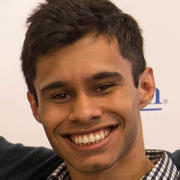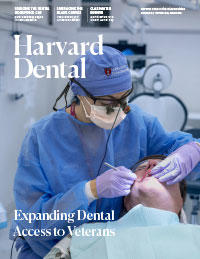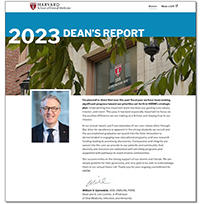
Second-year DMD student Nisarg Patel, was recently selected as one of ten finalists in this year's President's Challenge. The Challenge, with a grand prize of $100,000, aims to catalyze student-led ventures to solve some of the world’s most critical problems. It provides Harvard students with an opportunity to take their ideas and turn them into startup businesses with the support of the University and the Harvard Innovation Labs (i-lab).
Patel’s project, Memora Health, is a suite of population health communication and analytics technologies that focus on improving preventative health via mobile remote care management. One of the features is a dashboard that allows clinicians to manage a patient’s medications, and set up automated texts to remind them when to take their pills.
Before coming to HSDM, Patel received undergraduate degrees in molecular bioscience and biotechnology, political science and international studies from Barrett, the Honors College at Arizona State University. He is a co-founder of startups that apply technology solutions to healthcare issues. He and his partners recently won the second annual Brigham and Women’s Hospital Shark Tank competition with a prize of $2,500 for Memora, as well as a pitch competition at the Harvard Business School's SPARK entrepreneurship conference.
On April 25, Patel will compete in the President’s Challenge Demo Day at the Harvard i-lab, which will be followed by an announcement of the grand prize winner. Patel shared his insights on the competition:
Q: What are your thoughts on making it this far in the President’s Challenge?
A: I keep a folder of all the feedback–from patients, physicians, entrepreneurs, VCs, and friends–that our team has received over the past year. When I drafted our proposal for the President’s Challenge, the first thing I did was paste every single piece of feedback into the document and make sure we had strong answers to all of them. Knowing the caliber of the students here and the high-quality of their ventures, I understood that our proposal had to be as complete as possible and treated it the same way I’d treat an academic publication, with significant review, editing, and data that backed our claims.
Making it to the finalist stage has been a tremendous honor. It’s both humbling and inspiring to be among the ten finalist teams this year and the challenge has only made our team more excited about where we can take Memora Health in the next few months.
Q: If you win, how will you use the funding?
A: We’ve reached out to many different types of practices, specialties, and use-cases, to see where we can provide the most value to our healthcare system and develop the ideal product-market fit. We’d utilize the funding to jumpstart additional clinical pilots to reach more patients and learn more about how we can best improve the quality of their care. We hope that our focus on building an accessible, lightweight platform for preventative healthcare delivery will allow us to eventually expand to developing countries, where we’ve seen a growing burden of chronic disease and trends in technology adoption that favor mobile phones as a medium for healthcare delivery.
Q: How do you balance your DMD studies and your work as an entrepreneur?
A: I've found entrepreneurship to be both a creative and competitive outlet, and having this experience makes me think more deeply about how the basic science and clinical concepts we learn in class can be translated into applications to improve healthcare.
Balancing both hasn’t been easy, but I’ve found that parts of my education and endeavors into healthcare entrepreneurship have been complementary. My Patient-Doctor 1 (PD1) course as a first-year was the inspiration for this venture.


